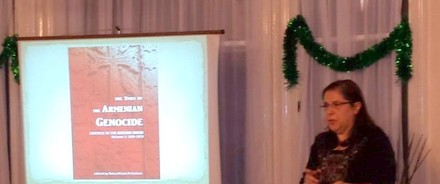Katia Peltekian Book Launch in London
The Tekeyan Cultural Association Hye Doon/Armenian House of London hosted the launch of Katia Peltekian’s two-volume “The Times of the Armenian Genocide: Reports in the British Press (1914-1923)”. The book is of utmost relevance, especially from the British perspective in the lead up to the Centenary of the Armenian Genocide in 2015. The presentation received a rousing response from attendees.
On Friday 22nd November 2013, the Tekeyan Cultural Association (TCA) in London organised a gathering at Hye Doon (“Armenian House”) in Kensington to launch the newly published book “The Times of the Armenian Genocide: Reports in the British Press (1914-1923)” compiled and edited by Katia Minas Peltekian.
The evening began with an introduction by the TCA of their activities in London, with a background to the activities of the Armenian Genocide Centenary Commemoration Committee (AGCCC) in the lead-up to centenary of the Genocide in 2015. After welcoming the audience and highlighting the obvious relevance of the book especially from a British perspective, the TCA welcomed Ms. Peltekian who had independently worked on the compilation & publication of her two-volume work over several years.
Ms. Peltekian began her presentation with a brief introduction of her work which compiles over 1,000 items from British newspapers, stating that not much research is done on the British reaction to the on-going massacres of the Armenians perpetrated by the Turks, although the British were more involved in the region than the USA at the time. The Blue Book by Lord James Bryce and Arnold Toynbee, published at the end of 1916, is perhaps the only British book that is referred to extensively. She said that although history is not a subject she liked or even studied, she learned a lot by reading old newspapers.
Ms. Peltekian then presented a series of samples of the over 1,000 items she had located in the British Press, specifically in “The Times” and “The Guardian”. These items included reports written by correspondents of the newspapers with such headlines as “The Extermination of Armenians,” “Destroying a Nation,” “Torture of Armenian Women,” “The Murder of a Race,” “Murder of Armenian Children,” and “20,000 Armenian Women & Children Massacred in Baku.”
However, what was more interesting to the audience was that the British Parliament had debated and discussed the Armenian situation some 70 times during the 10 years between 1914 & 1923 in both the Houses of Lords & Commons. Ms. Peltekian said that for most Armenians, Lord Bryce is well-known for his interest in the Armenian Question; however, upon reading the proceedings of the Parliamentary discussions, it comes to light that there were a number of British Lords and MPs who continually demanded action from the British government to help the Armenians during and after World War One.
The audience were surprised to learn that the Labour Party had sent a proposal in which it demanded to never let Turkey rule the Armenians again, insisting that the provinces where Armenians constituted the majority of the population before the War would be released from Turkish rule; or that Gandhi himself spoke against the partitioning of the Ottoman Empire, and threatened insubordination by the Moslems of the British Empire if Britain ever contemplated the idea of partitioning of Constantinople from Turkey; or the fact that the Armenians in the city of Manchester had raised enough money to buy two aeroplanes for the small Republic of Armenia; or that Mustapha Kemal, aka Ataturk, had ordered his troops to “hate the British and the French with all their might, and instead respect and serve the sacred Turco-German-Bolshevik alliance of 1920.”
The presentation also included samples of Editorials and Letters to the Editor written by British and non-British individuals, both from the official and non-official circles, demanding that Britain do the honorable duty towards the Armenians. Finally, Ms. Peltekian demonstrated some of the appeals that were published in the papers to help the Armenian refugees and orphans. Most of these appeals came from the Lord Mayors of the cities of London and Manchester who had both established funds to help the destitute Armenians. Some of these ads took up one whole page or half page of the newspaper. These ads were published in poster forms as well.
Following the presentation, Ms. Peltekian answered some questions from the audience after which she signed copies of her book.
The Tekeyan Cultural Association, London Chapter, was established in 1975 and is affiliated with the Tekeyan Trust, a registered charity in the UK. It is dedicated to the preservation and promotion of Armenian cultural identity and to furthering links between the Armenian Diaspora and Armenia.

